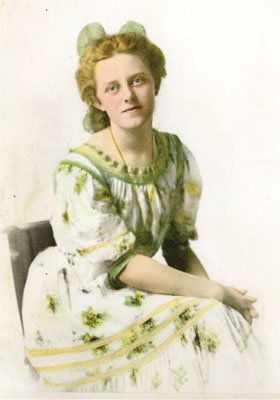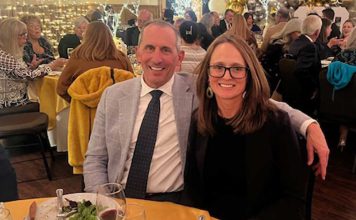Many of you have followed my story this past year regarding the
loss of my mother. In sorting through her belongings, I made an
astonishing discovery last weekend: a stash of letters written in
1918 by a World War I soldier.
Many of you have followed my story this past year regarding the loss of my mother. In sorting through her belongings, I made an astonishing discovery last weekend: a stash of letters written in 1918 by a World War I soldier.
The letters were addressed to my grandmother, Eunice Brown, before she married or had a family. When I held the thin parchment paper in my hands for the first time and gazed upon the faint brown ink, I was transported back to another time and place, to that spring 91 years ago when a young U.S. soldier was exchanging letters and photos (“snaps”) with my grandmother, a girl he had never met.
He signed his initials with a flourish: “T.M.F.H.” In the beginning, he addressed my grandmother as “Dear Miss Brown,” but later on, he began with the less formal:
“My Dear Eunice: If I may address you as such. 344th Infantry, Camp Grant, Ill. March 10, 1918.
“I have been working night and day and am writing this in my tent at 2:30 a.m. by lantern light. Your ever welcome letter received, with the snaps, but I think you are real stingy with your ink, as that was a very, very short letter. Hereafter, if you should get the writer’s cramps, be sure and take a little finger exercise, and then go on with the writing. If you knew how your letters drive the blues away, from a lonesome Soldier Boy, out on the prairie, and nowhere to go, you would write longer letters, and oftener.”
March 24, 1918 – “Your letter arrived today, and I am answering it at once. It pleases me very much to know that you are going to wear that emblem, and I know that you will think of me, now and then. You are doing duty to your country, by working through the Red Cross, and making fudge for lonely soldiers. Just think Eunice, if every soldier, in our army had a girl, who would write them such interesting letters, send them snapshots, fudge, and other remembrances like you have me, what a high standard of morale our Army would have. Using the words of Ambassador Gerard: They would fight till H___ freezes over.
“You have no more contempt for the men who don’t respond, than I have: My idea of a young man, who will not give his service to his country, is lower than a snakes belly, and that drags on the ground.”
May 11, 1918 – “We returned from Byron, Ill., today, after a long hike in the mud, which was ankle deep in places. We live in long, low quarters, partitioned off, into magnificent rooms, each six by eight feet. They are built of rough lumber, boards placed one inch apart (for the purpose of ventilation), knot-holes in each and every board, serving two purposes, first to look out, and second to let the flies out to air themselves. Windows without blinds, some with and some without panes. Roof covered with tar paper, and when it rains, we are perfectly dry! (provided we wear our raincoats). So you see, you need not be jealous of our country home.”
Congress declared war April 6, 1917. The U.S. Army drafted 4 million men. By summer 1918, the U.S. was sending 10,000 fresh soldiers to France every day. The war ended Nov. 11, 1918. In 19 months of war, 116,708 U.S. soldiers lost their lives.
May 24, 1918 – “Well, you rest assured that if I go to France you will get some of the best views I can get. My Kodak goes along … There are rumors that we will soon leave here – (Gee I hope so) – any place but here. We are looking forward every day, for the order, sending us ‘Over There.’
“We are going to parade through the town of Rockford tomorrow, during a Liberty Loan Celebration. The total distance we will march is only 14 miles.”
June 12, 1918 – “I would be a very lonely soldier if I didn’t have anyone to write to, and believe me, Miss Brown, your letters have driven many cases of the blues away. Well, I suppose I will have to live on dreams, for awhile, but I thought some of my dreams would surely come true by this time, and they are all of the bestest kind. I am going to hit the hay, and dream of my trip to see you. – Best wishes, Your soldier boy, T.M.F.H.”
There are no more letters after June 16, 1918. Did he get sent to France? Did he survive the war? My grandmother didn’t marry until 12 years later, when she met the man who would become my grandfather. Why did she keep these letters for the rest of her life?
I may never know all the answers, but this Fourth of July, an unknown soldier who served our country with great patriotism is remembered as his letters once again see the light of day.













